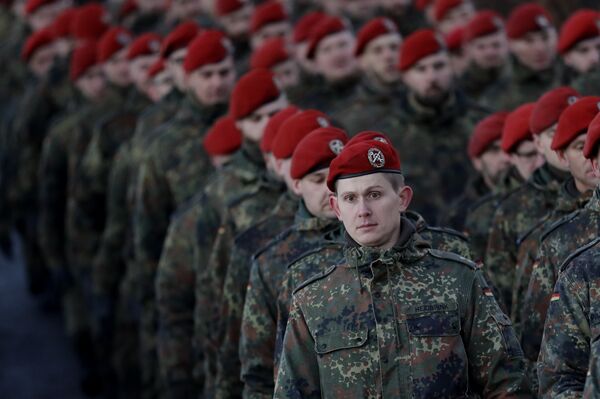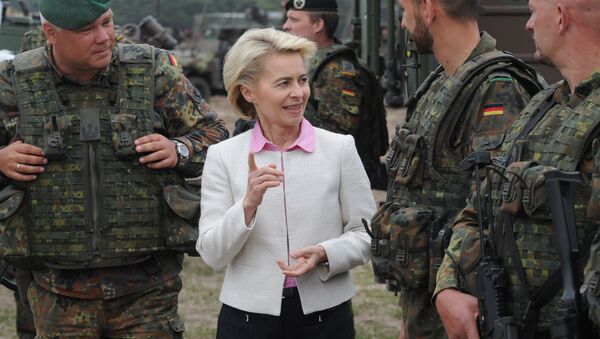The nomination of current German Defence Minister von der Leyen for the EU top job has caught Europeans by surprise, according to Daniele Pozzati, a Munich-based Italian journalist and political observer.
"The big surprise was von der Leyen. Many in the German media thought, or had hoped, her political career to be over", Pozzati said, referring to ex-EU Parliament President Martin Schulz's remark that von der Leyen is Germany's "weakest minister".
It appears that the Germans share Schulz's concerns: according to the latest opinion poll conducted by public broadcaster ARD, 56 percent of respondents opined that the politician was hardly a good choice for the EC top position, with only 33 percent saying that von der Leyen will make a good European Commission president.
The Germans' reaction to von der Leyen's pick was somewhat predictable given the controversy surrounding her career as the country's defence minister. Previously, the media reported about a disturbing shortage of equipment and spare parts for weapons, as well as a staffing shortfall in the national armed forces under von der Leyen's supervision. In addition, the Bundestag raised the alarm over the Defence Ministry's violation of public procurement rules in granting multi-million deals to contractors.
"The Bundeswehr’s condition is catastrophic", wrote Rupert Scholz, a former German defence minister, summing up von der Leyen's string of errors, last week, as quoted by Politico Magazine.
Von der Leyen: A Compromise Figure for Paris, Berlin, Rome & V4
What's behind the surprising pick endorsed by both Berlin and Paris, especially given French President Emmanuel Macron's vocal opposition to the nomination of another German politician, MEP Manfred Weber?
"Von der Leyen ideologically fits in with the neoliberal modus operandi of Macron so in this sense there was no conflict on the basis of policy or mentality", suggested Adam Garrie, a UK-based geopolitical analyst and director at the Eurasia Future think tank. "Although there is putative equality among the members of the EU when selecting a commission president, in reality the operational culture in Brussels is that which perennially favours those from Germany, France or the culturally and politically similar Benelux countries".
Garrie drew attention to the fact that Southern, Eastern, and much of Central Europe (with the exception of Germany) are "increasingly marginalised in this process": "Imagine for example a populist Greek or Hungarian gaining such a major role? There's a reason it is unthinkable - because it is practically impossible", he noted.
As for von der Leyen’s poor record as German defence minister, Adam Garrie recalled that "this is by no means the first time that ministers and politicians who were either nobodies or failures in their own countries get 'kicked upstairs' for well-paid and comfortable positions at the EU level".
"If anything von der Leyen will continue this trend of being wholly unremarkable in her position as the most powerful woman in the EU. This ought to give all of Europe pause for thought", the geopolitical analyst said.

For his part, Pozzati presumed that von der Leyen became a sort of a compromise figure not only for Germany and France, but also for the Visegrad Group and Italy.
He recalled that apart from von der Leyen, Merkel and Macron had considered the candidacy of Frans Timmermans, the a Dutch national and the current first vice-president of the European Commission. However, as Forbes pointed out on 1 July, Poland, Hungary, the Czech Republic, and Slovakia signalled strong reservations towards the socialist politician.
"Germany long backed Belgian and Dutch candidates to reduce the visibility of its power within the EU", the Italian political observer presumed. "The rise of the Visegrad Group, a small group of countries who oppose Germany-France leadership, and the new Italian government, forced Merkel and Macron to amend their plans. So their first choice for president of the European Commission, Frans Timmermans, was out, and Ursula von der Leyen was in".
Will Ursula von der Leyen Give a Boost to the EU Army?
There is yet another commonality uniting Merkel, Macron, and von der Leyen, namely their EuroArmy idea.
Thus, French President Macron warned that Europeans cannot be protected without a "true, European army". He was later joined by German Chancellor Merkel who said that a common European army "can be a good complement to NATO".
For her part, von der Leyen endorsed the idea of EU states joining their militaries, adding, however, that national governments should remain responsible for their armies. She also underscored in February 2018 that an "army of Europeans" should not pose a challenge to NATO, but "remain trans-Atlantic".
According to Pozzati, the EuroArmy plan could play right into the hands of Germany, which remains a "marginal player" in terms of military force within the EU.
"Berlin's only bet to regain some military clout is though the creation of a German-led European army", the Italian journalist presumed, adding that the German political establishment also favours the creation of a European army
"There's no doubt that von der Leyen's appointment is a boost for the very worrisome idea of a pan-EU army", Garrie foresees. "As such, the more individuals like Macron push for this woefully anti-democratic, anti-individual liberty and needlessly expensive idea, the more push back there will be among already growing Eurosceptic movements across the continent".

How Will New Appointments Affect the EU Strategy?
In early July, Belgian interim Prime Minister Charles Michel and Italian MEP David Sassoli were appointed to lead the European Council and European Parliament, respectively. Spain’s Josep Borrell Fontelles is considered a candidate for high representative of the union for foreign affairs and security policy, while Germany's Ursula von der Leyen and France's Christine Lagarde are likely to take EC and ECB offices.
The question then arises as to how the new cohort of European politicians will influence the bloc's political and economic strategy.
According to Garrie, the aforementioned political figures "represent a morass of neoliberal economics, anti-individual liberty policy making, big government, opposition to the sovereignty of nation states, pro-militarism, hostility to Asian superpowers (think China and Russia), hostility to Turkey in many cases and at a cultural level a snobbery that is both anti-American and anti-British".
"In summary, it will be business as usual but if history is a guide, the EU tends to get more power hungry and less democratic with every passing year", the UK-based geopolitical analyst said.
Pozzati holds a slightly different stance: "These appointments are still an improvement, in my opinion", he said.
"France's Christine Lagarde will try to save the Eurozone by appeasing, at least a bit, the Eurosceptics", the Italian political observer believes. "Lagarde began her career as a politician before turning into a technocrat. Her approach is more pragmatic, more political and paradoxically less ideological than that of EU economists. So watch that space for minor adjustments to the EU austerity policy – but don't expect a revolution".
According to him, the new EU leadership "represents the attempt, by the EU, to change a little, to appease popular dissatisfaction a little, by staying fundamentally the same".
"Let's see how substantial that improvement will be", Pozzati concluded.
The views and opinions expressed by the speakers and contributor do not necessarily reflect those of Sputnik.




